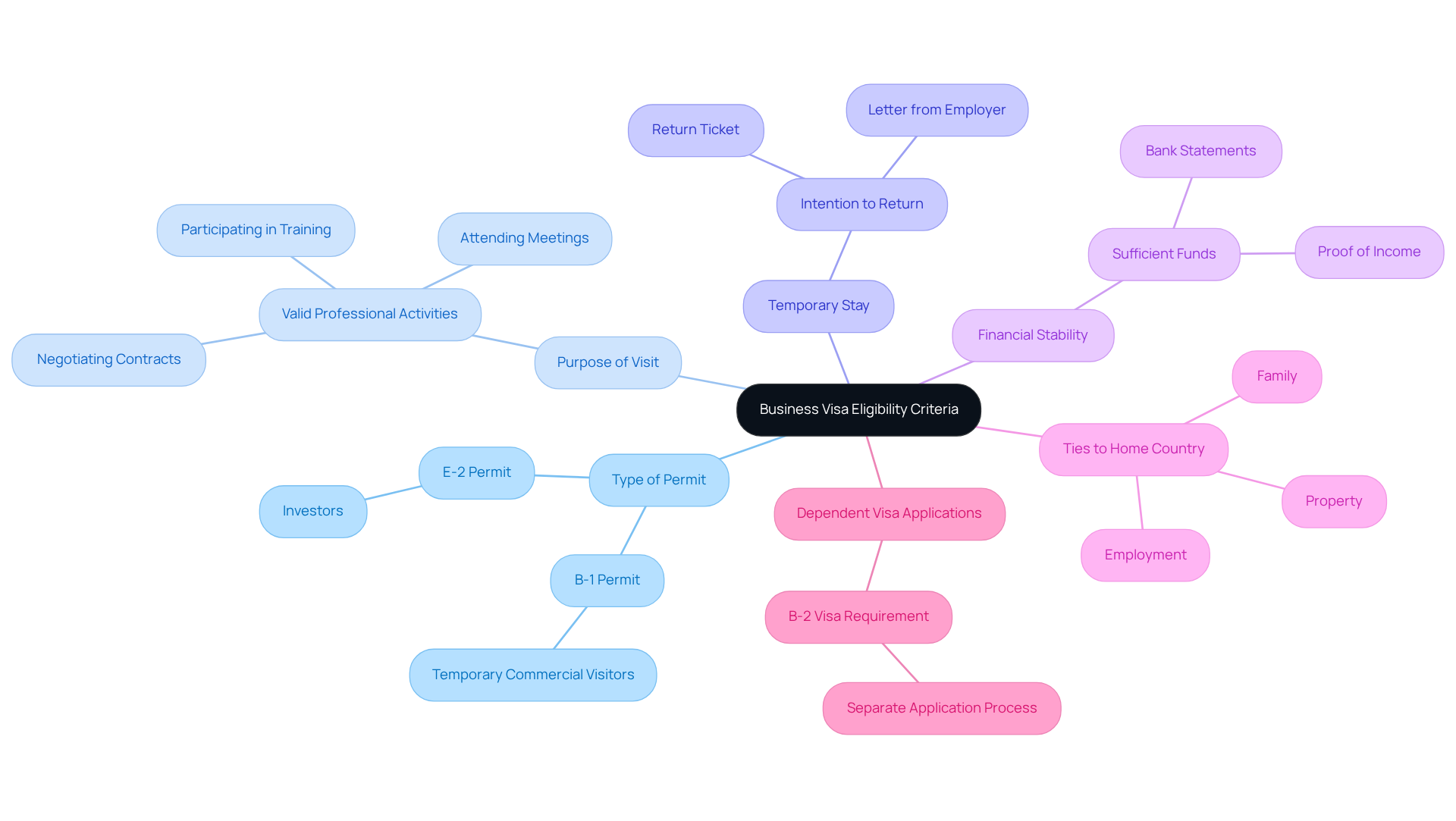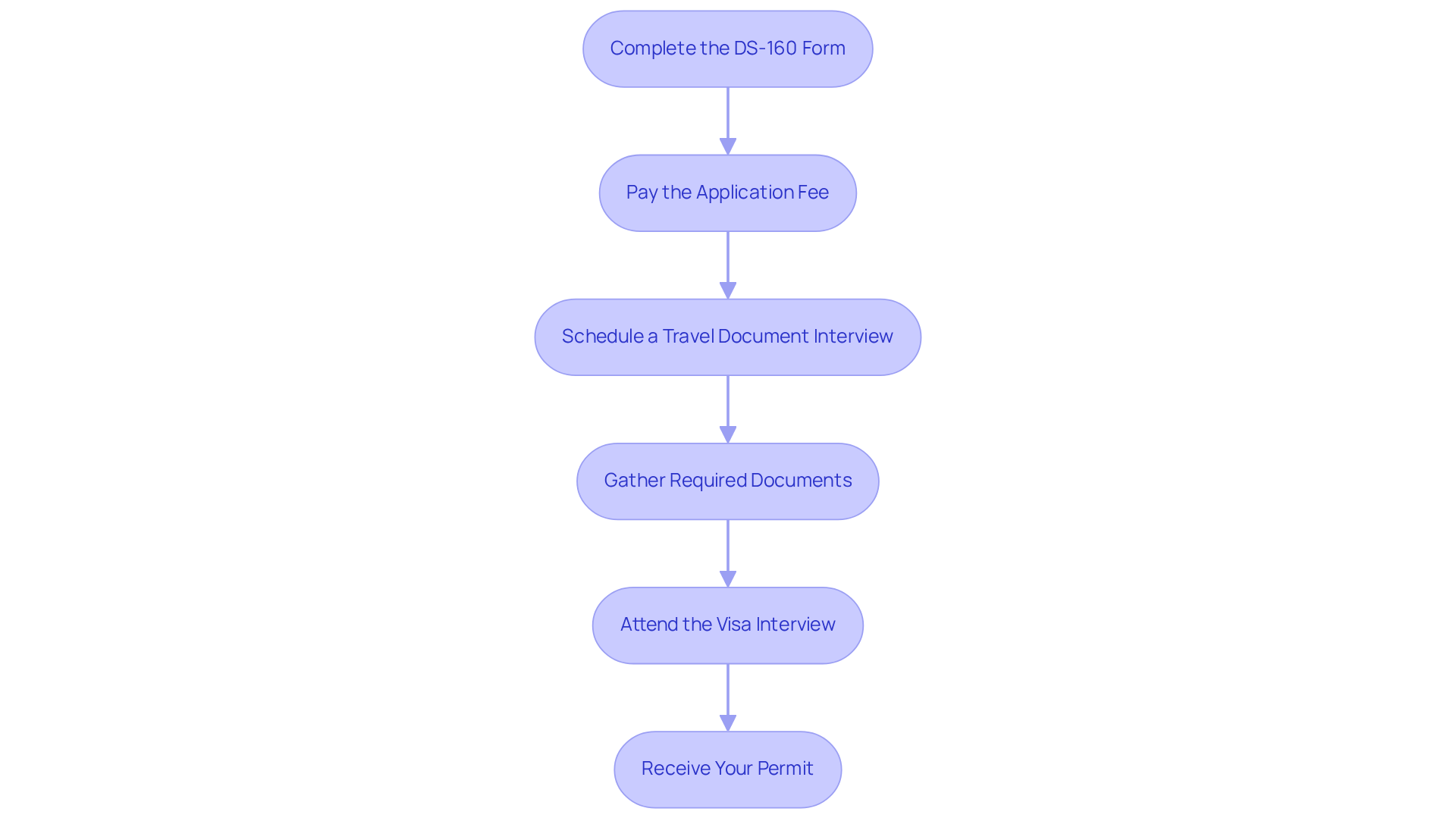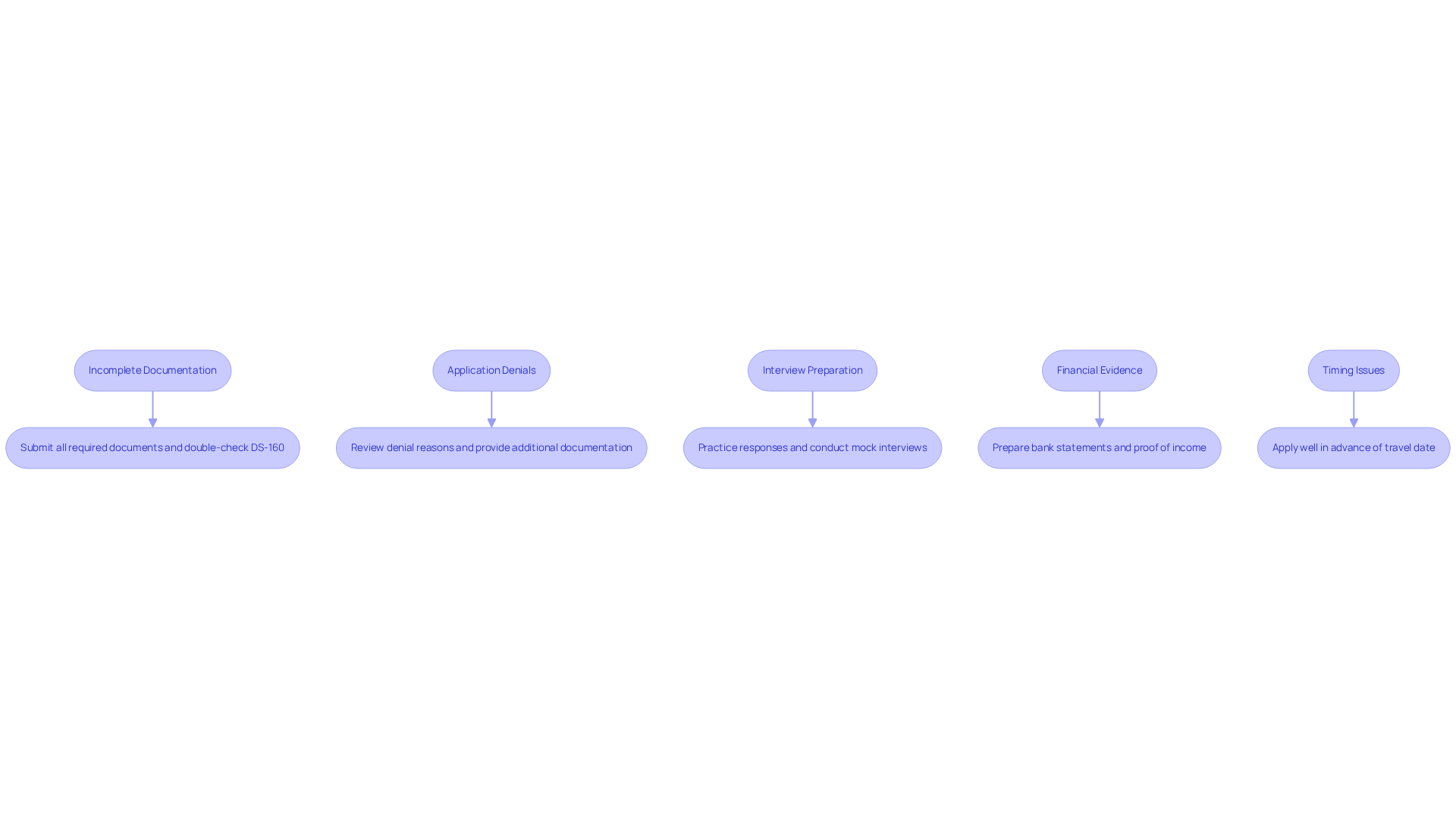Overview
This article serves as a practical, step-by-step guide for securing a business visa to the USA. It addresses the real struggles applicants face, such as confusing immigration processes and the anxiety of potential denial. By detailing eligibility criteria, application processes, and common challenges, we aim to demystify this journey.
Understanding the importance of meeting specific requirements is crucial. Demonstrating ties to your home country and preparing the necessary documentation can significantly enhance your chances of approval. We’re here to fight for you and ensure a smooth application experience.
Have you ever felt lost in the immigration process? You’re not alone. Our guide is designed to empower you with the knowledge and support you need to navigate these challenges. Remember, your future matters to us, and we’re committed to standing by your side every step of the way.
Introduction
Navigating the complexities of securing a business visa for the USA can feel overwhelming. Have you ever felt lost in the immigration process? With a myriad of requirements and steps involved, it's crucial for entrepreneurs and professionals looking to expand their horizons to understand the eligibility criteria and application process.
But what happens when an application is denied or when unexpected hurdles arise? This guide not only outlines the necessary steps to successfully obtain a business visa but also addresses common challenges applicants face.
Remember, you’re not alone in this journey—we’re here to fight for you and ensure you’re well-prepared for what lies ahead.
Understand Eligibility Criteria for a Business Visa
To qualify for a commercial permit in the USA, it's crucial to meet specific eligibility requirements. Here are the key points to consider:
- Type of Permit: Identify which permit category fits your needs. Common options for obtaining a business visa USA include the B-1 permit for temporary commercial visitors and the E-2 permit for investors.
- Purpose of Visit: You must demonstrate that your visit is for valid professional activities, such as attending meetings, negotiating contracts, or participating in training.
- Temporary Stay: You should intend to stay in the U.S. temporarily and provide evidence of your plans to return to your home country, like a return ticket or a letter from your employer.
- Financial Stability: Show that you have sufficient funds to cover your expenses during your stay without needing to work in the U.S. This can include bank statements or proof of income.
- Ties to Home Country: Establish strong ties to your home country, such as family, employment, or property, to prove your intention to return after your visit.
Additionally, it’s important to note that dependents of B-1 permit holders must apply independently for a B-2 permit, which is a crucial part of the process.
Statistics indicate that the approval rate for B-1 permits remains strong, showcasing the U.S. government's commitment to supporting legitimate travel for commerce, such as obtaining a business visa USA. By ensuring you meet these criteria, you can confidently move forward in the application process.

Follow the Step-by-Step Application Process
To successfully apply for a business visa, follow these steps:
-
Complete the DS-160 Form: Start by filling out the Online Nonimmigrant Application (DS-160). Ensure all information is accurate and matches your supporting documents. Pay special attention to your business purpose and ties to your home country—these are critical for demonstrating your intent to return.
-
Pay the Application Fee: After submitting the DS-160, pay the necessary application charge, usually around $185. Keep the receipt as evidence of payment; it will be required for your interview.
-
Schedule a Travel Document Interview: Arrange your appointment for the travel document interview at the nearest U.S. embassy or consulate. Wait times can vary significantly, so it’s wise to schedule your interview well in advance.
-
Gather Required Documents: Collect all necessary documents, including:
- A valid passport with at least six months' validity beyond your intended stay
- DS-160 confirmation page
- Visa fee receipt
- Evidence of business activities, such as invitations or contracts
- Financial statements to demonstrate your ability to support yourself during your stay
- Proof of ties to your home country, such as property ownership or family connections
Remember, B-1 visa holders cannot receive wages from a U.S. source, so ensure your documentation reflects your intent to engage in permissible activities only.
-
Attend the Visa Interview: Arrive at the embassy or consulate on the scheduled date. Be ready to answer questions about your business activities and intentions. Clear and honest communication is key to a successful interview. Keep in mind that overstaying a B-1 permit can lead to cancellation and re-entry restrictions, so it’s essential to comply with your permit's conditions.
-
Receive Your Permit: If approved, your permit will be stamped in your passport. Before leaving the consulate, review the details for accuracy to avoid any issues during your travels.
By diligently following these steps and understanding the constraints and prerequisites of the B-1 permit, you can simplify the process and significantly improve your chances of securing a business permit.

Troubleshoot Common Issues During the Application
Throughout the submission process, candidates often encounter typical challenges. Here’s how to tackle them:
-
Incomplete Documentation: It’s crucial to submit all required documents. Double-check your DS-160 form for accuracy and completeness. Missing or incorrect information can lead to delays or denials.
-
Application Denials: If your application is rejected, take a close look at the reasons provided by the consular officer. Common issues include insufficient ties to your home country or unclear intent of visit. For example, one client faced denial due to a lack of demonstrated ties, which was resolved by supplying additional documentation of family and property ownership. This highlights the importance of showcasing strong connections to your home nation, as seen in the case of Ms. M, whose applications were repeatedly denied after her permit was canceled due to inadequate ties.
-
Interview Preparation: Prepare for your interview by practicing responses to common questions. Be clear about your business objectives and how they align with your permit type. A mock interview can build your confidence and clarity in your answers. As Andrew T. Chan emphasizes, "Clients are best served by lawyers with expertise in consular processing," underscoring the importance of thorough preparation.
-
Financial Evidence: If questioned about your financial stability, be ready to present bank statements or proof of income that demonstrate your ability to support yourself during your stay. For instance, applicants who provided comprehensive financial documentation were more likely to overcome initial concerns raised during their interviews. Statistics show that those with transparent financial records have a significantly higher success rate in obtaining their permits.
-
Timing Issues: Apply well in advance of your intended travel date to account for processing times and potential delays. Statistics indicate that requests submitted early are more likely to be processed smoothly, reinforcing the need for timely submissions.
By understanding these common challenges and preparing accordingly, you can navigate the application process more effectively and enhance your chances of securing a business visa.

Conclusion
Securing a business visa for the USA is not just a formality; it’s a vital step for professionals eager to engage in legitimate commercial activities within the country. We understand the challenges you face in navigating the complex application process. By grasping the eligibility criteria and meticulously following the application steps, you can significantly enhance your chances of obtaining the necessary permit. Presenting valid reasons for your visit, demonstrating financial stability, and showcasing strong ties to your home country can help you make a compelling case to consular officers.
The essential steps for a successful application include:
- Completing the DS-160 form
- Paying the application fee
- Scheduling an interview
- Gathering required documents
- Preparing for potential challenges
Each of these steps is crucial in ensuring that you meet the necessary requirements and present yourself effectively during the interview. Addressing common issues such as incomplete documentation, application denials, and financial evidence can further streamline your journey toward securing a business visa.
Ultimately, navigating the business visa application process requires thorough preparation and a clear understanding of the requirements. For those aspiring to conduct business in the USA, taking proactive measures—such as applying well in advance and ensuring comprehensive documentation—can make a significant difference. By following the outlined steps and insights, you can confidently approach your visa application, paving the way for successful business ventures in the United States. Remember, we’re here to fight for your family and your future. Yo Peleo — We Fight.
Frequently Asked Questions
What are the main types of business visas available for the USA?
The common types of business visas include the B-1 permit for temporary commercial visitors and the E-2 permit for investors.
What is required to demonstrate the purpose of my visit for a business visa?
You must show that your visit is for valid professional activities, such as attending meetings, negotiating contracts, or participating in training.
Is it necessary to prove that my stay in the U.S. will be temporary?
Yes, you should intend to stay temporarily and provide evidence of your plans to return to your home country, such as a return ticket or a letter from your employer.
What financial information do I need to provide for a business visa application?
You need to show that you have sufficient funds to cover your expenses during your stay without needing to work in the U.S. This can include bank statements or proof of income.
How can I establish ties to my home country when applying for a business visa?
You can establish strong ties by demonstrating connections such as family, employment, or property, which prove your intention to return after your visit.
Do dependents of B-1 permit holders need to apply for their own visa?
Yes, dependents of B-1 permit holders must apply independently for a B-2 permit.
What is the approval rate for B-1 permits?
Statistics indicate that the approval rate for B-1 permits remains strong, reflecting the U.S. government's commitment to supporting legitimate travel for commerce.




